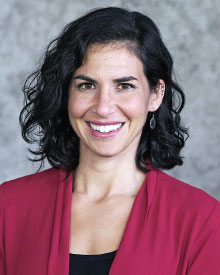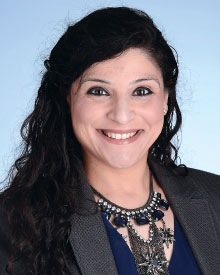The Medication First approach to treating opioid use disorder (OUD) sounds simple enough: Provide prescriptions for buprenorphine, methadone, naltrexone, or combination drugs to treat symptoms of withdrawal and maintain treatment, then add individualized psychosocial services as necessary. But when the Missouri Department of Mental Health used money from a federal Opioid State Targeted Response grant in 2017 to move the state toward the Medication First approach, Angeline Stanislaus, M.D., the department’s chief medical director in adult services, saw just how far the state had to go to implement the model.
“Even though Suboxone [buprenorphine and naloxone] was available, doctors weren’t prescribing it. All we had was group therapy,” Stanislaus, a psychiatrist, told Psychiatric News. “Medications were dangled as a carrot. If the patient didn’t attend the proposed number of group sessions, the medication would be terminated. Some of them were in groups six or seven hours a day. That is too much, let alone for someone who is in withdrawal.”
To Stanislaus, making patients wait until they have completed several group therapy sessions before prescribing medication for them is akin to putting the cart before the horse. It makes more sense to her to make sure their cravings are under control so they can think of something other than relieving them—like therapy to address the issues underlying the OUD.
“I’m not saying therapy is not beneficial. It is, and most patients will require it and need it. But therapy is more successful when it’s not forced upon them,” Stanislaus said.
Convincing state agencies, mental health and addiction professionals, treatment center administrators, and peer counselors of the logic behind Medication First took persistence, but sticking with it has proven fruitful. In the first nine months of the initiative, 14 state-contracted treatment agencies operating 38 sites used the grant funding to implement Medication First, and now all state-affiliated treatment centers in Missouri are required to offer services that align with the approach.
Convincing Stakeholders Is Key
To get stakeholder buy-in, Stanislaus and her colleagues worked in multidisciplinary opioid crisis management training teams consisting of physicians, mental health professionals, and office and clinic managers who ran successful clinics based on the Medication First principles; peer counselors; and people in recovery. The teams traveled around the state to provide targeted training at three levels: the system level, the organizational level, and the provider level. Team members discussed topics such as the opioid-related death toll in the state, what medication-assisted treatment (MAT) is, what buprenorphine is and how it’s used, how to initiate a buprenorphine clinic, how to conduct patient intake, and how to manage workflow. Mental health professionals explained that although counseling is offered in the Medication First approach, it is not required. Patients shared their stories about how MAT changed their lives.
At the system level, the teams sat down for multiple discussions with the leaders of entities like the Missouri Department of Social Services, which runs the state’s Medicaid program.
“At that level, it can feel daunting,” said Rachel Winograd, Ph.D., an associate professor of research at the University of Missouri, St. Louis, who serves as the director of the Missouri Institute of Mental Health’s Opioid State Targeted Response Team. “We were talking about reimbursement amounts, Medicaid rules regarding MAT, and things that we couldn’t change ourselves. We were fortunate that leaders in Missouri were open-minded and willing to make changes.”
One such change was to drop the prior authorization requirement for buprenorphine from the state’s Medicaid program after the team explained that it could delay access to MAT long enough for patients in withdrawal to give up, walk away, and seek out illicit opioids to ease their symptoms.
At the organizational level, the teams spoke with administrators, clinicians, and counselors.
Winograd noted that treatment center administrators often had financial concerns about the Medication First approach because it would change the way they billed for their services.
“They have to keep their lights on and pay their staff, so we had to attend to their bottom line,” she said. “We had to learn and understand their billing practices and clinical flow first, and find experts who could help them.”
At times organizational buy-in depended on counselor buy-in because many counselors have been through abstinence-based treatment programs themselves, said Stanislaus.
“They believed that even medication was not true abstinence. We had to challenge that thinking,” Stanislaus said.
The teams also encountered physicians who were hesitant to offer buprenorphine—which they expected.
“We realize it’s a lot of effort to learn a new medication, especially when it’s a controlled substance,” said Roopa Sethi, M.D., a clinical assistant professor of addiction psychiatry at the University of Kansas. Sethi’s role is to provide training in MAT to physicians and offer guidance on obtaining “DATA waivers,” which allow physicians, nurse practitioners, and physician assistants to prescribe buprenorphine for OUD under the Drug Addiction Treatment Act of 2000.
“Different people were in different phases of acceptance. Some wanted to get licensed, others had not bought in,” Sethi said. “It was a challenge, but we had success by doing multiple sessions. We’d go to the sites two or three times just for questions and answers and then go back to do the actual buprenorphine training later.”
Stanislaus said that thorough education on buprenorphine was necessary.
“I had doctors say, ‘Now I’m supposd to make [patients] addicted to another substance?’” Stanislaus said. “There is a lack of understanding of how the brain changes in [patients with] opioid use disorder and how [MAT] could at least reverse some of that process.”
“I’m delighted that they’re doing this and reaching out and educating the clinicians who mean well but may not be fully aware of the latest research,” said Petros Levounis, M.D., M.A., a professor and chair of the Department of Psychiatry at Rutgers New Jersey Medical School and an addiction psychiatrist. Levounis and his colleagues offer a buprenorphine clinic based on principles similar to those of Medication First, where counseling is not a condition of receiving medication. He knows firsthand that the approach may require a shift in perspective among addiction psychiatrists.
“We pride ourselves that we are evidence based and can be objective, but our training and culture point to the idea that combination treatment with medication and psychotherapy or counseling will give us the best results. That idea has so much momentum that it is difficult to appreciate that, as long as patients take their buprenorphine, you can have almost identical results with or without formal psychotherapy,” Levounis said.
Program Shows Positive Results
An analysis in the Journal of Substance Abuse Treatment by Winograd and colleagues suggests that the Medication First approach is working. In the first nine months of implementation, MAT use rose from 44.8% to 85.3% in the population treated through centers participating in the initiative. Medications for OUD treatment were prescribed significantly faster, with the median time to prescribing plummeting from 8 days to under a day. Retention of patients one month into treatment rose from 49% to 68.6% and remained higher than pre-implementation levels through the sixth month. Finally, monthly costs for OUD treatment fell 21%.
Sethi encourages psychiatrists to become more involved in providing MAT, not only because they are in an excellent position to treat both the OUD and the psychiatric comorbidities that often accompany substance use disorders, but also because of the impact MAT can have on patients’ lives.
“They come back and say, ‘Thank you, you saved my life,’” Sethi said, reflecting on her own patients. “They were in bad relationships, they had no job, they were homeless. Then they get jobs, they get their kids back, they have healthy relationships. You see how much it improves their lives, and you’re helping them in so many ways.”
The Medication First study was supported by the Substance Abuse and Mental Health Services Administration. ■
“Implementation and Evaluation of Missouri’s Medication First Treatment Approach for Opioid Use Disorder in Publicly Funded Substance Use Treatment Programs” is posted
here.




